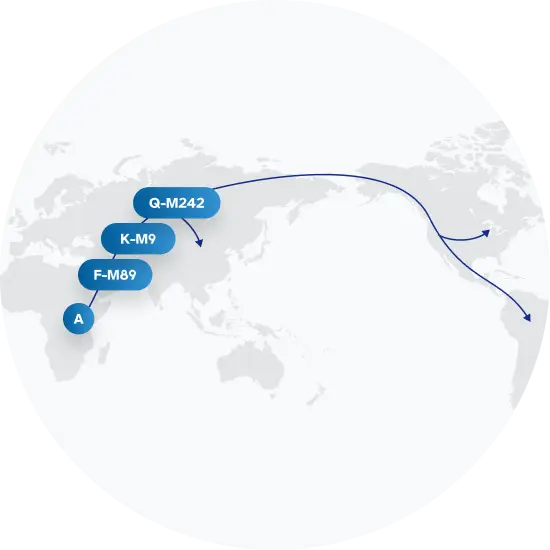Explore the Family Name Fabian
How common is the last name Fabian in the United States?
Based on the Decennial U.S. Census data, the surname Fabian has increased in popularity between 2000 and 2010. Originally ranked 3034th in 2000, it moved up to the 2738th spot by 2010, reflecting a rise of approximately 10 percent. In terms of absolute numbers, the count of individuals with the Fabian surname rose from 10,951 to 13,161 within this decade - an increase of over 20 percent. This suggests a significant growth in the prevalence of this surname within the United States.
| 2000 | 2010 | Change | |
|---|---|---|---|
| Rank | #3,034 | #2,738 | 9.76% |
| Count | 10,951 | 13,161 | 20.18% |
| Proportion per 100k | 4.06 | 4.46 | 9.85% |
Race and Ethnicity of people with the last name Fabian
Regarding the ethnic identity associated with the surname Fabian, the Decennial U.S. Census data reveals some shifts between 2000 and 2010. The highest percentage change was observed within the Hispanic community, which saw an increase from 33.97 percent to 44.94 percent. Conversely, the White population with this surname decreased from 59.46 percent to 48.09 percent. Although smaller in numbers, it's noteworthy that the proportion of Asian/Pacific Islanders with this surname also grew by 26.33 percent. Other groups such as those identifying as Two or more races, Black, and American Indian and Alaskan Native saw decreases in their percentages.
| 2000 | 2010 | Change | |
|---|---|---|---|
| White | 59.46% | 48.09% | -19.12% |
| Hispanic | 33.97% | 44.94% | 32.29% |
| Asian/Pacific Islander | 3.19% | 4.03% | 26.33% |
| Black | 2.05% | 1.88% | -8.29% |
| Two or More Races | 1.11% | 0.87% | -21.62% |
| American Indian and Alaskan Native | 0.22% | 0.18% | -18.18% |
Fabian ancestry composition
23andMe computes an ancestry breakdown for each customer. People may have ancestry from just one population or they may have ancestry from several populations. The most commonly-observed ancestry found in people with the surname Fabian is British & Irish, which comprises 25.5% of all ancestry found in people with the surname. The next two most common ancestries are French & German (22.7%) and Eastern European (16.4%). Additional ancestries include Spanish & Portuguese, Indigenous American, Italian, Ashkenazi Jewish, and Scandinavian.
Ready to learn more about your ancestry? Get the most comprehensive ancestry breakdown on the market by taking our DNA test. Shop 23andMe
| ANCESTRY BREAKDOWN | COMPOSITION |
|---|---|
| British & Irish | 25.5% |
| French & German | 22.7% |
| Eastern European | 16.4% |
| Other | 35.4% |

Possible origins of the surname Fabian
Your DNA provides clues about where your recent ancestors may have lived. Having many distant relatives in the same location suggests that you may all share common ancestry there. Locations with many distant relatives can also be places where people have migrated recently, such as large cities. If a large number of individuals who share your surname have distant relatives in a specific area, it could indicate a connection between your surname and that location, stemming from either recent ancestral ties or migration.
Based on 23andMe data, people with last name Fabian have recent ancestry locations in the United Kingdom of Great Britain and Northern Ireland and Ireland.
| RECENT ANCESTRY Location | Percentage |
|---|---|
| Greater London, United Kingdom | 53.50% |
| Greater Manchester, United Kingdom | 53.50% |
| Lancashire, United Kingdom | 53.10% |
| Merseyside, United Kingdom | 53.10% |
| Glasgow City, United Kingdom | 53.10% |
What Fabian haplogroups can tell you
Haplogroups are genetic population groups that share a common ancestor on either your paternal or maternal line. These paternal and maternal haplogroups shed light on your genetic ancestry and help tell the story of your family.
The top paternal haplogroup of people with the surname Fabian is Q-M3, which is predominantly found among people with East Asian & Indigenous American ancestry. Haplogroup Q-M3 is descended from haplogroup Q-M242. Other common haplogroups include R-Z156 and R-L260, which are predominantly found among people with European and European ancestry. Other surnames with similar common haplogroups are: Adams, Fisher, Kramer, Fox, Smith, Green, Baumann, Freeman, Miller, Busch.
The most common maternal haplogroups of people with Fabian surname are: A2, H1, H. These most commonly trace back to individuals of European ancestry.
 Paternal Haplogroup Origins Q-M242
Paternal Haplogroup Origins Q-M242
Your paternal lineage may be linked to The Ancient One
When two college students stumbled upon a human skull on the banks of the Columbia River, neither the students nor the police who responded to their 911 call could have imagined the archaeological significance of this rare discovery. The skull — along with about 300 other bone fragments found near Kennewick, Washington — belonged to a 9,000 year-old nomad who Native Americans have dubbed "The Ancient One." Based on skeletal clues, The Ancient One (also known as "Kennewick Man") likely swam, wielded a spear, and hunted coastal fauna for the greater part of his lifeInitial craniometric studies suggested he descended from ancient Japanese and Polynesian-like people and had little in common with living Native Americans. This claim — refuted by the Plateau tribes of the Pacific Northwest — became the center of a decades-long legal battle over the provenance of the remains. When The Ancient One's genome was finally sequenced in 2015, the evidence revealed he was genetically most similar to modern-day Native Americans. In fact, local tribes were found to be direct descendants of a population closely related to The Ancient One; in 2017, he finally received a proper Native American burial. This critical discovery helps illustrate a genetic continuity between ancient and modern-day Native Americans. Furthermore, his paternal line belonged to haplogroup Q-M3, the predominant lineage among Native Americans today.
Your maternal lineage may be linked to Marie Antoinette
Because it is so dominant in the general European population, haplogroup H also appears quite frequently in the continent's royal houses. Marie Antoinette, an Austrian Hapsburg who married into the French royal family, inherited the haplogroup from her maternal ancestors. So did Prince Philip, Duke of Edinburgh, whose recorded genealogy traces his female line to Bavaria. Scientists also discovered that famed 16th century astronomer Nicolaus Copernicus traced his maternal lineages to haplogroup H.

What do people with the surname Fabian have in common?
Spoiler alert: it's complicated. People with the same last name are usually no more genetically similar than a randomly sampled group of people from the same population. That said, people with the same surname are more likely to have similar ancestries than randomly sampled individuals. The reason is the tendency of people with similar cultural or geographical backgrounds to preferentially mate with one another. That's why people who share a surname may be more likely to share traits and tendencies in common than people within the general population. Check out the percentages below to see the prevalences of tastes, habits, and traits of people with your surname compared with prevalences among 23andMe users.
Preferences
Traits
Habits
Wellness
Are health conditions linked to the last name Fabian?
The short answer is that, if there is an association between surname and health, it's usually more about your ancestry than your name. Individuals with a given surname are no more genetically similar than the general population but often have similar ancestries. The populations of people associated with those shared ancestries often have sets of genetic variations, also known as alleles, in common. Some of those alleles are associated with a greater likelihood of developing certain diseases.
Disease variant frequency by ancestry
Disease allele frequencies in populations associated with the surname Fabian are shown below. Important Note: not everyone with a disease allele will develop these health condition
























